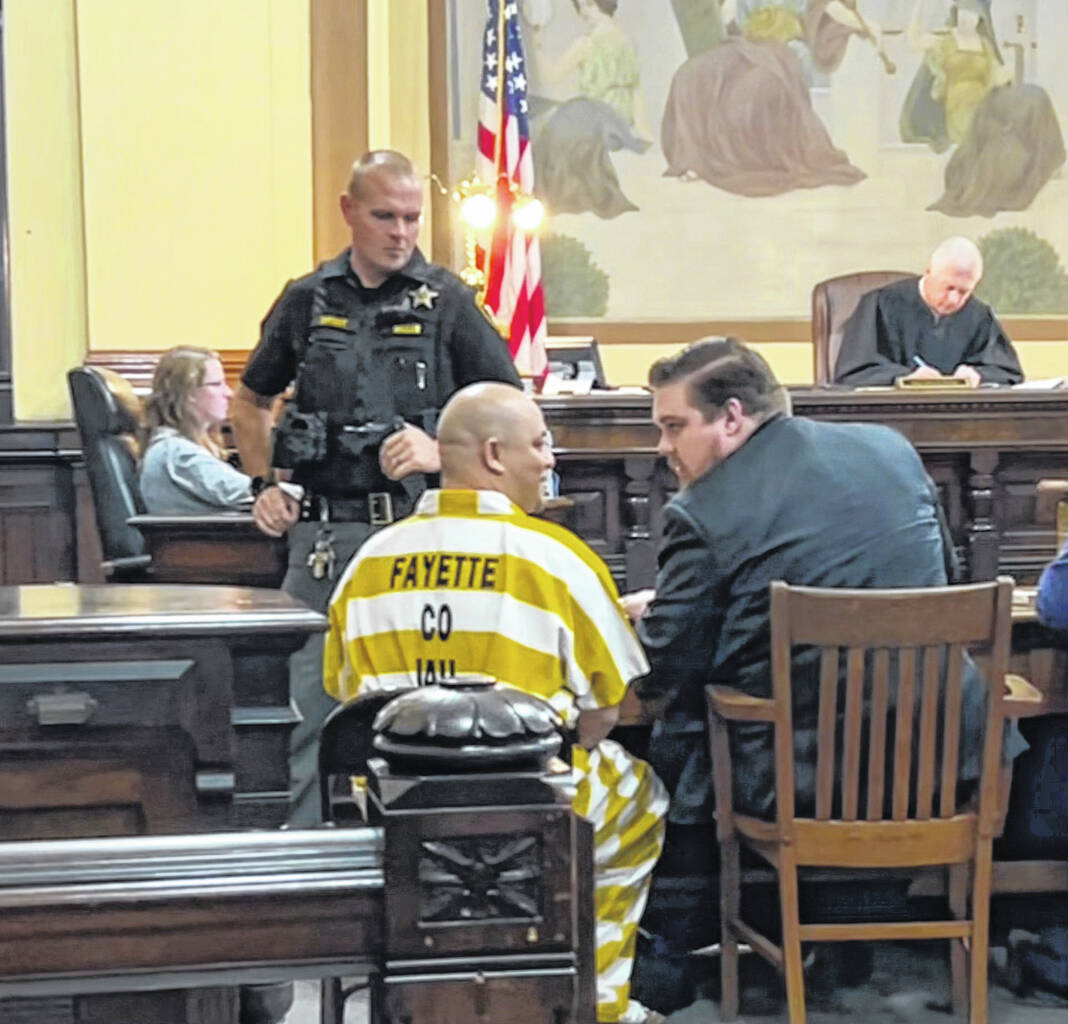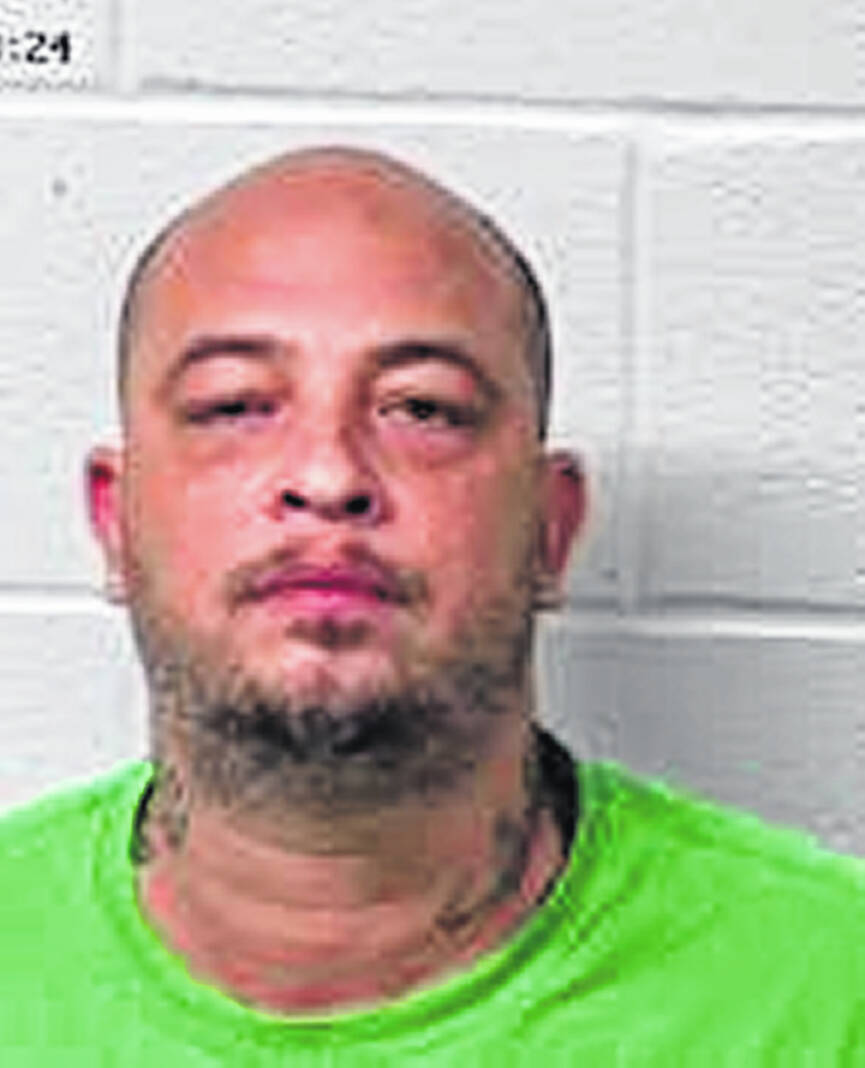
Marcos Baker and his defense team at the Fayette County Common Pleas Court for his sentencing on Tuesday morning.
Brya Labig | Record-Herald photo

Baker
WASHINGTON COURT HOUSE — On Tuesday morning in Fayette County Common Pleas Court, 44-year-old Marcos Baker was sentenced to 11 to 16-and-a-half years in prison after being found guilty of first-degree felony aggravated drug trafficking.
Baker’s reported drug trafficking occurred on Nov. 15, 2022. According to the grand jury indictment, Baker, of Jeffersonville, was caught trafficking methamphetamine in Fayette County in an amount that equals or exceeds 100 times the bulk amount.
On April 7, Baker was initially indicted on two felony counts of aggravated drug trafficking. Then on April 20, Baker filed a request to the court to be informed of any and all evidence intended to be used against him by the Fayette County Prosecutor’s Office, including evidence that could be favorable to him, physical evidence, and even witnesses.
After this request was filed, the prosecutors filed a certificate of non-disclosure on May 31 on behalf of the witnesses to protect their identity. The request for non-disclosure stated that legal counsel would be able to review the videos of the witnesses in private, at the prosecutor’s office.
However, Baker claimed the prosecutors were “vague” in their reasoning for hiding the identity of the witness, and filed a motion to compel the certificate of non-disclosure on Monday, June 12. Baker also claimed in the statement that the prosecutors “had no reason to believe he would coerce or endanger the witness,” which are the necessary grounds they must have to invoke that kind of protection.
According to court records, the following Wednesday, on June 14, Baker’s request to be informed of evidence was granted by the court, however, the prosecutor’s request for non-disclosure on behalf of the witness was also granted. This meant that although Baker would be informed of all evidence used, only counsel would be able to review videos of the witnesses in the privacy of the prosecutor’s office.
The next day, on June 15, the prosecutors provided their evidence discoveries with Baker and his attorney, which according to Baker, revealed that an informant “illegally searched his home” to confiscate the discovered evidence.
Baker filed a motion to suppress the evidence from being used in court against him. Additionally, Baker also filed to compel discovery of the calibration used to weigh the evidence, and filed again to be informed of metadata which would reveal the confidential informant. On top of that, Baker also filed to have the two felonies on his indictment split into two separate cases, because he claimed they were “two separate occasions.”
On June 26, the prosecutors moved quickly to protect the confidential informant by filing for non-disclosure on the videos being reviewed by counsel. This time, prosecutors backed the motion with accusations against Baker, who they reminded the court had his bond increased only days after his initial arrest due to alleged statements made by Baker during transport and recorded jail calls in regards to the witness. Prosecutors also claimed that Baker has continued to make comments and statements over recorded jail calls, and has engaged in assisting social media posts.
Two days later, on June 28, Baker once again filed for discovery in regards to the court scheduling an in-camera hearing seven days before the trial so that Baker and his attorney could review the footage and identify the confidential informant. Additionally, Baker filed for change of venue with accusations that Common Pleas Court Judge David Bender was “biased” toward him, due to an “incident” Baker claims happened between them 17 years ago. Baker said he reportedly flipped a table in the courtroom, and that he and Judge Bender were then involved in a “commotion” during one of Baker’s trials back in 2005, when Bender was elected as prosecutor.
By July 5, Baker had notified the court that he would bring his wife into court to back his alibi that he was with her at their home on Nov. 11, 2023 — the date stated on his indictment that he had allegedly been trafficking drugs. It was also by this time that he had filed to have all evidence used against him that was “illegally confiscated by search of his home” suppressed.
Only hours after Baker notified the court that he had secured his wife as an alibi for the date of Nov. 11, 2023, the prosecutors filed to change the date stated on the indictment from Nov. 11 to Nov. 15, with the claim that it was a clerical error on their behalf. However, Baker immediately filed against the change on his indictment, due to his claim that the initial date of Nov. 11 was the correct date.
The court allowed the prosecutors to change the date to Nov. 15 due to it being a clerical error.
On July 15, Baker officially released his attorney and appointed his own private counsel, according to court records. Baker then requested an investigator at the court’s expense, which was quickly denied because of a lack of credentials provided on the chosen investigator, and because the court found no reason to provide Baker with an investigat0r.
On July 18, the court denied Baker’s motion to change venue, as Judge Bender denied all accusations made against him. Bender claimed that Baker did, in fact, flip a table during a trial in 2005, when Bender was prosecutor, but Bender assured that he did not have a “commotion” with Baker following the incident.
The court also denied all of Baker’s filed requests, including: a private meeting between Baker and his unidentified defense team, a bond reduction, the severance of Baker’s two impending charges, and the motion to compel discovery.
On July 19, Baker filed again, this time to continue his upcoming hearing and trial dates, set for July 31 and Aug. 1, as his wife was now unable to appear in court due to her arrest and pending charges.
However, the court overruled Baker’s motion to continue the trial, and the dates would remain as scheduled on July 31 and Aug. 1.
Baker filed to demand for testimony on July 26, from Stanton W. Wheasler, who had previously examined the substances recovered. Baker had planned to confront Wheasler on the substance discoveries, however, the court did not find this necessary and overruled the motion.
The prosecutors finally revealed the identity of the confidential informant to both Baker and his defense team on July 27, according to court records. It was during the reveal that Baker discovered the informant had a history of epilepsy, and immediately began requesting background files on the informant such as; criminal records, physician records, medical records and prescription records dating back from September 2022 to present.
The prosecutors sought to protect the informant’s personal information by requesting the court to exclude all evidence regarding the informant’s medical history, as they found it was irrelevant to the case. The court was in agreement with this motion by the prosecutors, and denied Baker’s request for medical information on the informant. More specifically, the court found that the prosecutors “were not obligated” to provide the information requested, nor did they have it.
Finally, on Aug. 1, Baker’s trial was held and the jury found Baker guilty of one count of aggravated drug trafficking. However, the second felony count of aggravated drug trafficking was ruled a mistrial due to a hung jury.
The court scheduled a new retrial for the second felony count on Oct. 17.
However, leading up to the retrial, on Oct. 5, the Fayette County Prosecutor’s Office made the decision to dismiss the second count and proceed to a sentencing on the same scheduled date of Oct. 17.
At around 8:15 a.m., Baker appeared in court in front of Judge Bender for his final sentencing. Baker was sentenced to 11-16 1/2 years in prison, depending on his behavior while behind bars, with a jail time credit of 190 days.

